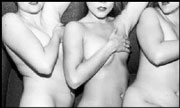THE EROTICA PROJECT
above Northwest Actors Studio, 1100 E. Pike, third floor, 325-6500, $14-$18 opens Thurs., June 21, 10 p.m. Thurs.-Sat.; ends June 30
NOBODY TALKS about sex in public. Oh, we’ve reached a point in society at which we can discuss in open forums our right to climax, tell each other it’s perfectly normal to masturbate, and call our genitals by their proper names. But real sex—with or without love, always so much more than the sum of its naked, heaving parts—is no crinkly-eyed therapist on PBS relating the spiritual bliss of mutual orgasm. Sex is dirty.
To suggest that women might actually think about it, turning it over in their waking reveries with the same conflicted passions as everyone else, is not yet universally accepted, even at this late stage in our supposed enlightenment. This is particularly true as it applies to heterosexual women, who are trapped in the popular psyche somewhere between that “daring” Sex and the City and throwing their panties at Tom Jones. Should we worry when Mel Gibson, fer chrissakes, is asking what women want?
Erin Cressida Wilson has a response: “All I want is this disease that paints circles under my eyes and keeps me saying idiotic things and empties the career out of my brain and throws feminism out the window with a single thrust, because sometimes I just want to be bent over, thrown down, and spread open and entered and conquered and colonized and nailed.”
It isn’t her only answer. “A Man in My Thighs,” quoted above, is only one of several short ruminations and purple fantasies that pulse through The Erotica Project. Lillian Ann Slugocki originated the literary titillation for radio, then, with Wilson and director John Gould Rubin, adapted it for the stage to considerable acclaim in New York. Some of it is overly effusive and much of it is politically incorrect. All of it is like sex.
“I was shocked by it,” Kibby Munson admits. “It made submission seem powerful, it made being single seem attractive.”
Munson was so compelled after reading the text that she avidly pursued and won the rights to produce the show’s West Coast premiere in Seattle. Publicity photo aside, the production doesn’t feature anything more than metaphorical nakedness, but Munson is hoping that people will be just as emotionally caught off guard as she was, and feel “some more excitement about exploring sexuality and busting limitations and enjoying their skin.”
The sense of exploration won’t be limited to the audience. “It’s the first thing I read in a long time that made my stomach fluttery,” popular fringe artist Maria Glanz, part of the four-actor and one-musician cast, admits. “Not like nauseated, but upset in a really interesting way.”
If The Erotica Project is going to intrigue the rest of us, it has to do so by avoiding the monotony of pornographic oral interpretation, a fact that hasn’t escaped director K. Brian Neel. An often virtuosic physical performer with his own slippery takes on human complexity (Munson sought him out after recalling his portrait of a stripper in Double Climax), Neel may be the perfect person to guide the show through its moves.
“WATCHING PORNO gets old,” he says. “There is an arc through the course of [this] evening. We’re not in your face about it, and we’re not self-conscious about it.”
“For me, it’s been getting really specific about who I’m talking to,” Glanz says. “I’m not just reciting it to the audience. Theater is all about relationship. What am I trying to achieve by saying these things out loud?”
It’s a good question. Can smut, even ornate smut, be given purpose? Actor Bhama Roget—who laughingly recalls her initial fear that the project might run along the lines of “Let’s get on stage and talk about our clits on Capitol Hill!”—found some revelation in the dare.
“I think when you really get into them, a lot of these pieces [bring] to life that dynamic that a lot of women have,” she reflects. “That dichotomy of being afraid of men and at the same time wanting to be fucked by them.”
Though that very dichotomy could be too much for audiences not ready to hear it, Munson is betting on the transforming effects of honesty.
“I really believe that theater has the power to change lives,” she says. “And this play puts some difficult subject matter in a new light that makes it seems OK—or if not OK, then at least a possibility.”








